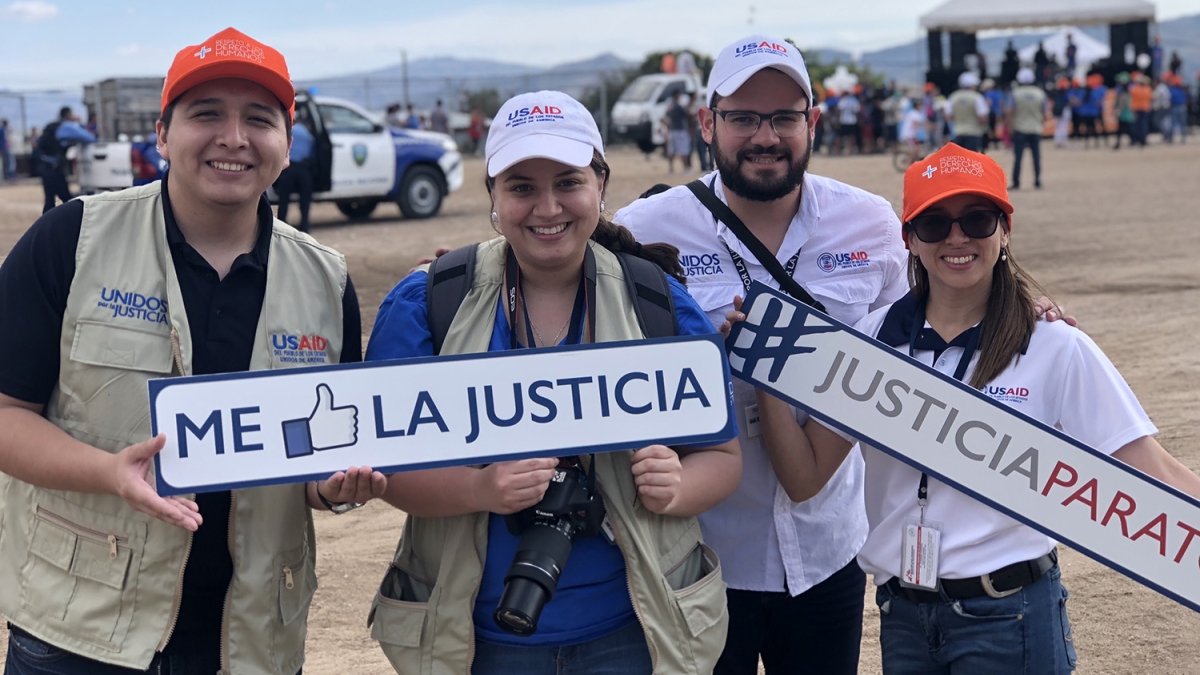ASU hosts conference to reduce violence in Latin America and the Caribbean

From left to right: Jonathan Hernandez from the ASU Center for Violence Prevention and Community Safety with Vivian Pavon, Ana Karina Suazo and Faiz Velazquez of Unidos Por La Justicia (United for Justice) at a community event in Tegucigalpa, Honduras held to establish a better relationship between the National Police and the citizens they serve.
Criminal justice experts from the Western Hemisphere will examine the impact of violence in Latin America and the Caribbean and how to prevent it at a two-day conference held at the Arizona State University Tempe campus April 11–12. The free event is sponsored by the Center for Violence Prevention and Community Safety, part of the School of Criminology and Criminal Justice at ASU in downtown Phoenix.
The event takes place as National Guard troops have been deployed to the U.S./Mexico border in advance of the arrival of a caravan of migrants from Central America that is making its way north through Mexico. Researchers from the center have studied violence in Honduras, El Salvador and nations throughout the Caribbean and are working on solutions to help governments and communities reduce violence. Charles Katz, a criminology professor and director of the Center for Violence Prevention and Community Safety, talks to ASU Now about the conference.
Question: Why hold a leadership conference on violence and its prevention in Latin America and the Caribbean?
Answer: Over the past 10 years, our faculty and staff have focused much of their effort on projects that diagnose problems associated with violence and have been collaborating with governments in these regions to identify and evaluate best practices to respond to violence in Latin America and the Caribbean. Today, these nations are at a critical point where they are about to embark on a major shift in policy and responses to violence. Given the relationships we have developed and the progress we have seen we believe that there is a unique opportunity for ASU to play an important role in the development and institutionalization of citizen security in the region.
Q: Can you talk about ASU’s role in researching violence in these regions?
A: ASU has played both large and small roles in examining violence in the region. From 2004 to 2010 we worked under contract with the Ministry of National Security of the Republic of Trinidad and Tobago to develop a comprehensive strategic plan to reform the Trinidad and Tobago Police Services. We have also completed a project funded by the United Nations Development (UNDP) program to assess citizen insecurity throughout the Caribbean; and completed work for the Eastern Caribbean’s Regional Security System (RSS) to diagnose the gang problem in nine Caribbean nations and develop a regional approach to responding to gangs. We have also completed several research projects for the U.S. Department of Homeland Security, U.S. Department of Justice, and United States Agency for International Development (USAID) to examine violence and responses to in El Salvador and Honduras.

ASU criminology professor Charles Katz speaks at the 2017 American Society of Evidence Based Policing Conference held in Phoenix.
Q: You’ve been interviewed a lot by major news organizations about the MS-13 gang. What kind of threat does the violence of gangs in Latin America and the Caribbean pose to the United States?
A: That is a complicated question with multiple issues interwoven through it. First, the violence in Latin America and the Caribbean has an effect on the U.S. in terms of the fact that people in those nations are driven from their countries to the United States in the hopes of finding a safer place for themselves and their families. The violence in those nations also has a substantial impact on those countries' economies, which also drives people to the United States in the hopes of better employment opportunities. While the vast majority of these immigrants have nothing but positive intentions and seek a better life for them and their family, a small minority of those who come have a deeply disturbing past and have ill intentions. These are the people that federal and local officials need to identify quickly to prevent violence from occurring in the U.S.
Q: Who will be attending the conference and what do you hope they come away with?
A: We have a variety of people who will be attending the meeting. Some of these folks are from USAID, UNDP and various organizations that attempt to work within developing nations to improve their security and decrease violent crime. Faculty from Brazil, Jamaica and the United States, as well as graduate students will be attending. We have also noticed some local criminal justice officials who will be attending the event.
Conference registration: Future of Violence and Its Prevention in Latin America and the Caribbean
More Law, journalism and politics

A new twist on fantasy sports brought on by ASU ties
A new fantasy sports gaming app is taking traditional fantasy sports and mixing them with a strategic, territory-based twist.…

'Politics Beyond the Aisle' series to explore the stories of public officials
In an effort to build a stronger connection between students and political and civic leaders, Arizona State University’s School…

ASU committed to advancing free speech
A core pillar of democracy and our concept as a nation has always been freedom — that includes freedom of speech. But what does…

